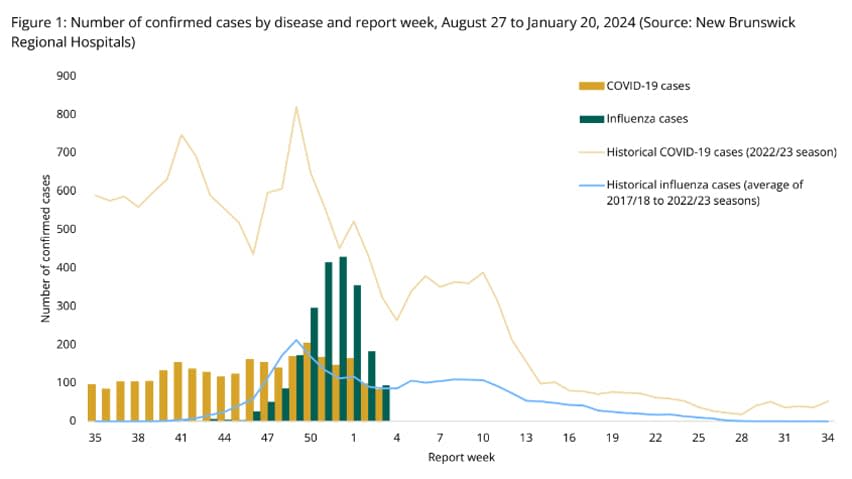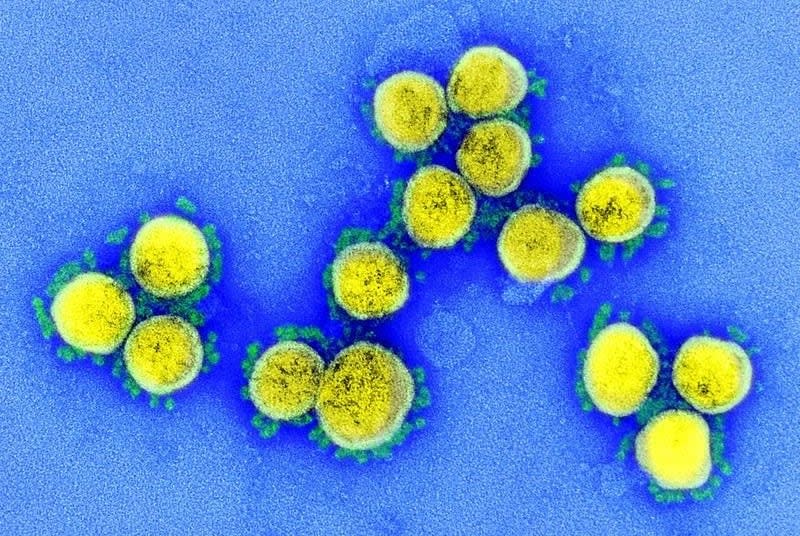COVID-19 kills 3 more in N.B., new variant JN.1 appears poised to become dominant

COVID-19 has killed three more New Brunswickers and a new subvariant, JN.1, appears to be on its way to taking over as the dominant strain in the province.
COVID-19 activity remains "moderate," according to Tuesday's Respiratory Watch report. Most indicators remained "stable" throughout the reporting period, Jan. 14 to Jan. 20, it says.
The flu has killed two more people, but influenza activity decreased during the reporting week, with the number of new cases dropping back to historical averages, the report shows.
The three people who died from COVID-19 were all aged 65 or older. Their deaths raise the pandemic death toll to at least 1,003, although the total is likely higher since the province has counted only people who die in hospital as COVID deaths since September.
Thirty-one people were hospitalized for or with the virus, three of whom required intensive care. That's down from 36 and six, respectively, in the previous report.
Among those admitted to hospital is a child under four. The others include four people aged 20 to 44, six aged 45 to 64, and 20 aged 65 or older.
The number of COVID outbreaks dropped to three from 14, according to the report, including one in a nursing home and two in "other facilities."
There were 82 new cases of COVID confirmed through PCR (polymerase chain reaction) lab tests, compared to 89 a week prior. The positivity rate — the percentage of PCR lab tests performed that produced a positive result — is seven per cent, unchanged.
About 2,600 more New Brunswickers rolled up their sleeves for the latest COVID vaccine in the past week, according to figures from the Department of Health.
A total of 138,662 COVID XBB.1.5 vaccines have been administered since Oct. 4.
Child under 4 among flu hospitalizations
The two people who died from the flu between Jan. 14 and Jan. 20 were both aged 65 or older, the Respiratory Watch report shows.
The flu sent 22 people to hospital, down from 31 the previous week. Two of them were admitted to intensive care, down from four.
A child under four is among those hospitalized. There are also two people aged 20 to 44, five aged 45 to 64, and 14 aged 65 or older, the report shows.
Two lab-confirmed flu outbreaks have been declared, down from five.

The number of confirmed COVID-19 and flu cases in New Brunswick by week, Aug. 27, 2023 to Jan. 20, 2024, as illustrated by the gold and green bars, compared to the historical averages, illustrated by the gold and blue lines. (Government of New Brunswick)
There was also one "influenza-like illness" outbreak at a school, down from two.
School outbreaks are based on 10 per cent absenteeism in a school because of influenza-like illness symptoms, the report says. No other information has been released.
New lab-confirmed flu cases dropped nearly 41 per cent to 94. They were all influenza A (unsubtyped).
These raise the total number of cases since the season began on Aug. 27 to 2,129.
The positivity rate is eight per cent, down from 12.
As of Tuesday, 210,036 New Brunswickers have been vaccinated against the flu since Oct. 4, the Department of Health said.
JN.1 now represents more than 44% of cases
JN.1 has been detected in New Brunswick, Department of Health spokesperson Sean Hatchard confirmed.
But he declined to say when, how many cases there are, or what percentage of sequenced cases it represents.
"New Brunswick isn't regularly releasing detailed breakdowns of COVID-19 sub-variants, as no other province in Atlantic Canada is doing so and there have been more than 100 genetic sequences of COVID-19 detected in the province since the beginning of the pandemic," he said in an emailed statement.
According to experts, while the strain has evolved like many of its predecessors to better evade the immune system and transmits more easily than other circulating variants, it has not shown any signs of more severe disease, and current vaccines are expected to provide protection.

BA.2.86 sublineages have now displaced recombinant XBB sublineages across the country and become the dominant lineage group, and JN.1 is the only one demonstrating consistent growth in Canada, according to the Public Health Agency of Canada. (U.S. National Institute of Allergy and Infectious Diseases)
The World Health Organization classified JN.1 as a "variant of interest," which is the second-highest rank after variant of concern, in December.
It is now the dominant strain in Canada. Data from the Public Health Agency of Canada shows the offshoot of BA.2.86 and its descendants accounted for more than 88 per cent of detections, as of Jan. 21.
On Monday, the U.S. Centers for Disease Control and Prevention (CDC) estimated JN.1 accounted for nearly 86 per cent of cases in the United States, as of Jan. 19. JN.1 remains the most widely circulating variant of SARS-CoV-2 in the United States and globally, the agency said.
JN.1 and its descendants were first detected in New Brunswick in November and now account for just over 44 per cent of sequenced cases in the province, as of Jan. 19, according to the volunteer group Protect Our Province New Brunswick (PoP NB), which aims to create easy-to-access information on COVID risks and protection measures.
That's up from about six per cent last month, according to the group.
PoP NB obtained the data through GISAID — an international non-profit project to share genome data on viruses, as contributed by the Vitalité Health Network's originating lab.
Vitalité hasn't updated monthly report yet
Horizon Health had 21 health-care workers off the job as of Saturday, after they tested positive for COVID-19, according to the network's weekly COVID dashboard. That's down from 30 COVID staff absences the previous week.
Horizon has 52 active COVID-19 hospitalizations, up from 46 last week. Four patients are in intensive care, unchanged.
There were still a number of Horizon hospital units with outbreaks, as of Tuesday, its website shows. They include:
Moncton Hospital — cardiac step down, family practice and palliative care.
Saint John Regional Hospital — family medicine.
Dr. Everett Chalmers Regional Hospital — psychiatry.
Oromocto Public Hospital — rehabilitation/geriatric.
Vitalité Health Network is expected to update is monthly COVID report today, but as of mid-afternoon has not.
It has, however, updated its COVD outbreak page, which shows one outbreak on the Dr. Georges-L.-Dumont University Hospital Centre's general surgical unit (4A).


